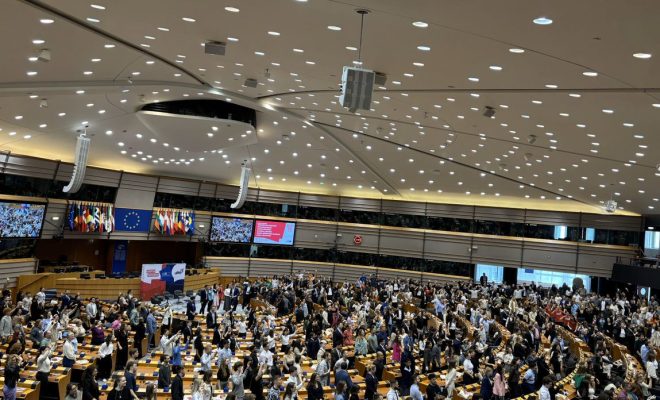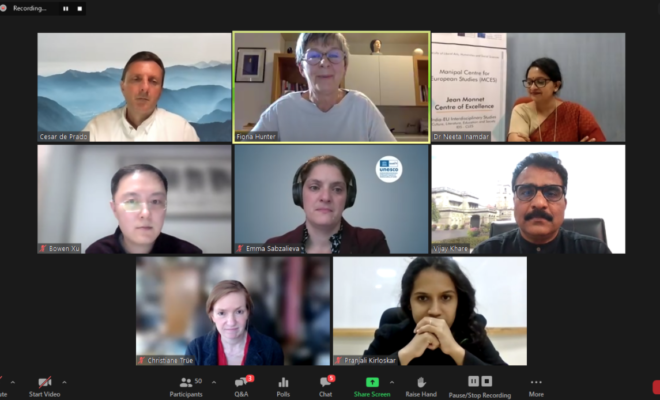The University of Costa Rica and the SDG: Integral Articulation and Social Commitment

By Henning Jensen-Pennington¹ and Yamileth Angulo-Ugalde ²
Introduction
In 2015, the United Nations General Assembly adopted the 2030 Agenda for Sustainable Development as a global instrument that, under the slogan “leave no one behind”, has an unprecedented scope since it contains a set of shared aspirations to achieve the well-being of all countries and humanity at large.
Costa Rica subscribed to this agenda and, like 192 other countries, committed to carry out articulated initiatives to contribute to the achievement of the 17 Sustainable Development Goals (SDG) and to reach the 169 proposed goals. With this in mind, the government of the Republic called on sectors of society to sign a national pact. Thus, a collective commitment was established to try to end hunger, fight poverty and inequality, promote education, health, environmental protection, and strengthen justice.
To contribute to the achievement of these goals, it is imperative for the public and private sectors, civil society, academia, and local governments to work together. Therefore, this national pact was signed by the three highest branches of government, the Supreme Electoral Tribunal and the National Council of Rectors (CONARE) of the state universities. The pact was signed by different private sectors, religious and civil society organizations, trade unions, the Ombudsman’s Office and the United Nations Resident Coordinator.
The University of Costa Rica (UCR) has joined these initiatives, in keeping with the provisions of its Organic Statute [1], which states that this institution must contribute to the transformations that society needs in order to achieve the common good. Thus, its aims and purposes aspire to the achievement of social justice, equity, comprehensive development, and full freedom. Throughout its history, the UCR has cultivated an institutional model in line with the sustainable development goals long before these were explicitly established in a global agenda.
The UCR, through work in the substantive fields of university work (research, teaching and social action), has historically worked on the fulfillment of the SDG in a tacit, but systematic and consistent manner.
Context and background
The Organic Statute of the UCR establishes, among its values and principles, academic excellence and equal opportunities for all people, respecting their freedom of expression, recognizing the diversity of ethnicities, cultures and sexuality, as well as commitment to the environment. These principles must be reflected in the actions of all its actors: the teaching staff, the student population and the administrative sector.
The three pillars of a state institution of higher education (research, teaching and social action – also called “extension” in many universities) are interconnected, so it is an explicit purpose for the faculty, students and administrative sector, in addition to specialized academic and professional training, to develop a comprehensive and humanistic vision in the exercise of their university activities. In this way, each member of the academic community should benefit from this type of training and, at the same time, contribute to the fulfillment of these three essential pillars.
This means that students participate in research and social action projects. This involvement is substantial to ensure institutional impact in the community. The faculty is committed to teaching and learning processes, and at the same time carries out research and social action or extension projects. And the administrative sector, which is fundamental in the organizational architecture of the university, also participates in these projects, all of which allows the values and principles of the institution to remain alive and active in all their dimensions.
From the very moment of its creation, in 1940, the UCR incorporated a social function to its purposes, aspiring to the formation of professionals necessary for economic and social development. Eighty years after its foundation, the UCR is now recognized as a university governed by the principles of freedom of thought and expression, a guarantor of justice and democracy, and a promoter of equality.
Now, what do we mean by “social action”? This concept refers to a relationship of dialogue between the university and society, which is based on knowing how to listen, learning continuously and respecting all knowledge. In this way, the university recognizes that creativity and knowledge are not exclusive to academia, while at the same time it vindicates and dignifies other forms of knowledge, such as ancestral, traditional and spontaneous knowledge.
At the beginning of the 1950s, in the so-called “work camps”, students and teachers of the UCR moved to rural communities, mainly to those with strong deficiencies and greater degree of vulnerability. These “expeditions” constituted the seedbed that began to germinate and gave as a result – at the beginning of the seventies – the social action programs and, specifically, the University Community Work (TCU), one of the pillars of the humanistic education of the UCR.
In broad terms, the TCU seeks to raise awareness and promote social and critical awareness among students and the university community; and to collaborate with communities in identifying their problems in order to develop their own solutions, within horizontal relationships conducive to mutual learning. This relationship aims for social change, but also for the university to enrich itself, learn and grow in its interaction with the community.
In 2017, to take one year as a reference, a total of 4,631 students did 1,038,150 hours of community work, in 164 projects in all areas of knowledge. Each project included between fifteen and twenty students; its formulation is interdisciplinary and thus brings together students from different epistemic backgrounds. The UCR has managed to consolidate a space for university social action not only through the TCU, but also through cultural and teaching extension, student initiatives aimed at the community and support associations.
For Costa Rica, these actions have been pioneering. Thus, important links and contributions have been made with vulnerable, marginalized or historically neglected communities. And one of the great lessons that underlies the work with each of them, and that has persisted over decades, is the intense and deep relationship between communities and their natural environment.
Commitment to sustainable development
An important part of this university social commitment is focused on environmental conservation, precisely by recognizing Costa Rica’s historical commitments in this area, and by addressing the lessons learned from the link between the university and society. In fact, the commitment to environmental sustainability is one of the policies that the institution established for the period 2016-2020[2].
Concrete initiatives have been derived from these policies. For example, the Environmental Management Unit was created to coordinate internal efforts in this area. One of its most important actions has been the establishment of the Environmental Award, which has committed many university bodies to the preservation of the environment.
In addition, a specialized commission values the forestry of the entire university in order to preserve and expand the environmental resources within each campus. It should be noted that between 2016 and 2020 the UCR experienced the largest infrastructure expansion process in its history, and was careful to ensure the conservation of its forest, in search of humanized spaces and a sustainable environment.
On the other hand, the UCR has a Network of Protected Areas that is dedicated to the protection of the natural reserves owned or managed by the University as a result of different agreements, which have been signed with public institutions to protect natural resources that show a great diversity. All this is done in accordance with national interests and university policies.
Due to its own nature, the School of Biology carries out research for the analysis and protection of biodiversity, especially in wetlands and forest ecosystems throughout the country. These investigations will be developed as of 2020 from the new Centro de Investigación sobre Biodiversidad y Ecología Tropical CIBET (Research Center on Biodiversity and Tropical Ecology). These actions are mainly associated with the achievement of the Objective of Sustainable Development of terrestrial ecosystems, with about 20 projects in execution.
The Centro de Investigación en Ciencias del Mar y Limnología CIMAR (Center for Research in Marine Sciences and Limnology) makes valuable contributions in the field of marine life, and has become a reference center for the achievement of the Sustainable Development Goal 14 of the 2030 Agenda. The Center’s research includes marine ecology, aquatic biodiversity, environmental monitoring and marine diversity. It also carries out analyses of reservoirs, rivers and lakes and has a referential support system for oceanographic information (MIO-CIMAR) that offers wave forecasting for the Costa Rican coasts, giving reliable support to fishermen and sailors in general.
Regarding the objective of clean water and sanitation, UCR units carry out research in different areas of the country and develop proposals for the protection of this natural resource and watershed management, as well as initiatives regarding irrigation systems, conservation of water quality and availability, and food security in coastal areas, among others. In this area, the Center for Research on Sustainable Development Studies (CIEDES), the Development Observatory (OdD), the Sustainable Urban Development Program (PRODUS) and the Center for Research on Environmental Contamination (CICA) support municipalities in different regions, as do projects and activities of the School of Engineering in Bio-systems, the Faculty of Microbiology and the School of Geology with their Masters in Hydrogeology and Water Resources Management.
When referring to the objective of action for climate, it is necessary to highlight a collaborative process among many actors, among which it is important to point out the work developed by the Center for Geophysical Research (CIGEFI), which studies climate variability, hydrology, statistical and numerical climate models, and collects and analyzes meteorological observations.
As for the objective on accessible and non-polluting energy, the UCR is contributing with research to obtain clean energy, reduce the carbon footprint and approach carbon neutrality. Among the most important actions are the studies that are carried out jointly with or for government entities by the Research and Development Network on Energy Efficiency and Renewable Energy (RIDER), in which teams dedicated to research in the areas of Engineering, Agro-Food Sciences and Chemistry, as well as the Electrochemistry and Chemical Energy Research Center (CELEQ), participate.
The action of the UCR on the study and protection of the terrestrial and underwater environment is strongly associated with the scope of other SDG, such as the reduction of poverty, food security, health and welfare, and responsible production and consumption. It is important to mention the role played by the Agro-food Sciences in the promotion of SDG related to the reduction of poverty, hunger and the guarantee of food health of the population. It is worth noting the collaboration that exists between schools and research centers and the national agricultural sector, which makes training in seeds and pests possible and is a very important input for ensuring that farmers have better and more efficient production procedures. The National Food Technology Research Center (CITA) plays an important role not only in this field but also in the development of innovative enterprises by supporting research and product innovation for small and medium-size enterprises.
One of the fundamental pillars of the work of the UCR is the respect for the diversity of ethnicities and cultures, and of human life in general, as well as the struggle for equity. These pillars encourage participation in the improvement of living conditions and the inclusion of different social groups as a fundamental part of the development of a culture of plural coexistence. The Center for Research on Women (CIEM), the Institute for Research in Education (INIE), and the Institute for Social Research (IIS) have played an important role in the progress towards the achievement of Goals 5 and 10 related to gender equality and the reduction of inequalities. In addition, mention should be made of the Social Action Program for the Inclusion of Persons with Cognitive Disabilities (PROIN), which has enabled a group of young people to develop, contribute and integrate into our society.
With regard to the Health and Welfare goal, there is a close relationship between the university and the national health system, not only in the academic preparation and training of health personnel working in the basic community care teams, in clinics and hospitals, but also in research and scientific-technological development efforts. It is important to highlight the work of the Health Research Institute (INISA) and the Pharmaceutical Research Institute (INIFAR), which contribute to quality control of medicines, as well as information on medicines to the entire Costa Rican population.
The Center for Research on Tropical Diseases (CIET) makes an important contribution to the Ministry of Health on communicable and non-communicable diseases.
Recently, the UCR, thinking of providing a contribution of great scientific relevance for the benefit of our inhabitants’ health, created the Laboratory of Teaching in Surgery and Cancer (DCLab) which aims to support the specialized and personalized diagnosis of cancer, as well as possible treatment; in addition, it carries out the training of the medical and nursing corps in the field of minimally invasive surgery for the benefit of patients, both in the intervention and in the early recovery. In addition, a cyclotron has been acquired and installed for the production of radiopharmaceuticals, diagnosis and research in cancer and other thematic areas. The Center for Research in Nursing Care and Health, created in November 2019, closes the virtuous circle of instances of interdisciplinary cooperation in this field.
The training of various sectors to meet Goal 8 of decent work, and to prepare many young people and, for example, housewives, is carried out from a perspective of educational outreach, which is a dimension of the field of social action carried out by the university. Many of these courses, such as those offered by the School of Modern Languages, especially English, the School of Computer and Information Technology and the Computer Center, the School of Public Administration and the School of Business Administration, aim to provide tools for better employment for these sectors of the population, helping to reduce the gap in opportunities that exists among young people from various socio-economic sectors and seek to reduce unemployment, underemployment and informality, with rates that have risen in recent decades, as it has in all of Latin America.
Engineering, for its part, contributes in various ways to the development of the country, and to the achievement of the SDG in those aspects related to industry and innovation, sustainable communities, responsible production and consumption, and technological development. The contribution of engineering to various governmental and non-governmental entities aims at the global development of our country, and to the intrinsic development and production of the university itself, generating employment and therefore social development.
Many examples illustrate UCR’s commitment to national welfare and its vision of social responsibility. However, we would like to highlight two particular cases that have national relevance and one of them, in addition, has a special international relevance.
The first example is the degree in Engineering in Sustainable Development, which is offered at the Atlantic Campus, a regional campus of the UCR. This is an academic initiative of particular importance, not only for Costa Rica, but for the entire Central American region. The fact that it is taught at a regional campus is an added value, since it is located in a socio-economically depressed region. From the beginning, the objective of this career has been to develop a professional option to promote a pragmatic change in production and economy, while simultaneously preserving the environment and stimulating social well-being. This implies fostering a “green sensibility” that encompasses the entire process or life cycle of a product or service, which begins with the raw material, its processing and distribution, and ends with its disposal.
A professional in this field can work in solid, liquid and gaseous waste management in accordance with environmental and social legislation; and many other topics.
The other example is, the Clodomiro Picado Institute, which is dedicated to contribute to the solution of the problem of poisoning by venomous animals in Costa Rica and other countries, as well as to the national scientific-technological development, through a group effort that involves research, teaching, social action and production activities.
As part of its substantive activities and in order to contribute knowledge about snake-bite poisoning to society in general, the Clodomiro Picado Institute (ICP) developed a social action program through which various sectors are trained to treat and prevent snake-bite poisoning. Likewise, in its role as a drug manufacturer, the continuous improvement that marks the line of work of ICP is associated with a constant review of its products, processes and the impact achieved by its drugs.
The ICP has varied and consolidated lines of research – ranging from the epidemiology of the ophidic accident and the study of the mechanism of action of ophidic toxins, to clinical research on anti-venoms, but we would like to emphasize that its research dynamic is reflected in a prolific and recognized development and production of anti-venoms for human and veterinary use that benefit the country, the Central American region and even other latitudes, as is the case of an antidote to neutralize the venom of the Dendroaspis polylepis snake, an African species better known as the black mamba, which causes the death of a person in less than 20 minutes.
This antidote, which is in its experimental stage, consists of a panel of specific human antibodies against the dendrotoxins of the black mamba. This breakthrough represents a historic scientific milestone, as it is the first attempt on a global scale to use human antibodies to combat snake-bite poisoning, and promises to be more compatible with the organism and less likely to have harmful reactions.
This initiative has been led by the company Iontas and the Technical University of Denmark, and the contribution of the ICP was based on the analysis of proteins of mamba venom, on the recognition of the main toxins of this poison, and on the neutralization capacity tests of the recombinant antibodies.
All this shows that social commitment is a fundamental part of every effort made in a laboratory and is the result of the impact of research and academic action on society. Likewise, the Clodomiro Picado Institute has tried to find solutions to the problem of the pandemic generated by the COVID-19 that affects the world since December 2019, for which it has produced a treatment based on the purification of plasma antibodies from horses immunized with SARS-COV-2 virus proteins. This product is in its final stage of clinical analysis in patients.
Yes: social processes are long, and take many years. Scientific processes require time to consolidate and become concrete contributions that benefit people. But their results can change the course of a nation, to the point of accompanying it in the development it desires for its future generations
By way of closure
Undoubtedly, higher education in Costa Rica and, in general, in Latin America and the Caribbean is a decisive factor for social mobility, and that is why the university as a cultural institution will continue to promote actions and efforts to close gaps and provide mechanisms to reduce inequality in access to all social, cultural, economic and political rights and goods.
The SDGs represent formidable challenges for higher education and all states and societies. In the Latin American and Caribbean region, the context within which these objectives must be achieved is complex and rich in tensions, contradictions and conflicts.
Universities can play a facilitating role in cooperation alliances and national and regional consensus, while at the same time seeking an integral articulation of multiple initiatives and complementary knowledge within their own ranks. Beyond inter-disciplinary or multi-disciplinary approaches, the aim is to achieve structural articulations within the university institution, but also in the public and private environment. This articulation is essential and indispensable if we are to move towards a social order that leaves no one behind.
¹Henning Jensen-Pennington Ph.D. Retired professor, former rector of the University of Costa Rica, 2012-2020
²Yamileth Angulo-Ugalde Ph.D. Professor, Faculty of Microbiology, Clodomiro Picado Institute, University of Costa Rica.
[1] The Organic Statute of the University of Costa Rica is available at: https://www.cu.ucr.ac.cr/estatuto-organico.html
[2] These institutional policies can be consulted at the following e-mail address: https://www.cu.ucr.ac.cr/uploads/tx_ucruniversitycouncildatabases/normative/politicas_institucionales_2016-2020.pdf
Photo by Alena Koval in Pexels.
RELATED ITEMS








